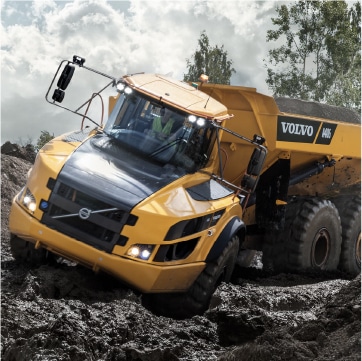
How to Reduce Wear and Tear on Your Heavy Equipment Tires
The performance of all your wheeled equipment depends largely on how their rubber meets the ground. Heavy equipment tires provide the stability and traction you need to effectively operate and move material where it needs to go. Implementing a few tire maintenance best practices can extend their lifespan and ensure your equipment continues to operate at its best.
Maintain the correct pressure
If the pressure in your wheel loader or skid steer tires is too low, you won’t be able to operate efficiently, and you’ll end up wasting fuel and money. If your tires are overinflated, the likelihood of a flat increases. Both situations will lead to abnormal, uneven, or accelerated wear and tear on all types of heavy equipment tires. We suggest having a reliable tire gauge on hand and checking the pressure once a day to ensure it’s within the range outlined by the manufacturer.
Make sure your operators are properly trained
Your machine operators should avoid tire spinning and obstacles whenever possible, minimize sharp or fast turns, and always try to take the shortest route when moving material across the jobsite. Spinning, abrasion, hard turns, and long distances will all cause wear on your heavy equipment tires. It’s also important not to drive too fast, as slower speeds allow more time to see and avoid potentially hazardous obstacles.
Check your tires before each shift
A key part of machine tire maintenance is visually inspecting them for any indications of damage or abnormal wear and tear. If you do see uneven wear, we recommend rotating the tires as soon as you can, which will help lengthen their lifespan. You should also check for bubbles, bumps, cracks, and anything that might be stuck in the rubber.
Be on the lookout for debris on the jobsite
The usual places where wheel loaders, skid steers, and other wheeled equipment operate are typically full of debris that will puncture and damage their tires. It’s critical that your operators drive carefully and stay away from areas with excessive litter or other objects. A flat tire can grind your job to a halt and lead to costly downtime.
Regularly clean your heavy equipment tires
Part of your tire maintenance routine should be washing them down periodically. Dirt, mud, and other debris can cover your wheel loader or skid steer tires and make it very difficult to visually inspect them for signs of damage. By cleaning them regularly, you’ll be able to see more easily if anything is out of the ordinary.
Store equipment properly
Too much exposure to sunlight can lead to expansion and cracking of heavy equipment tires. When storing your machines, it’s critical to keep them (and by extension, their tires) in a cool, dry place. It’s also important to try and avoid parking your equipment in the sunlight when they are not in use for extended periods of time.
If you have any questions about heavy equipment tires or tire maintenance in general, contact our team today.









